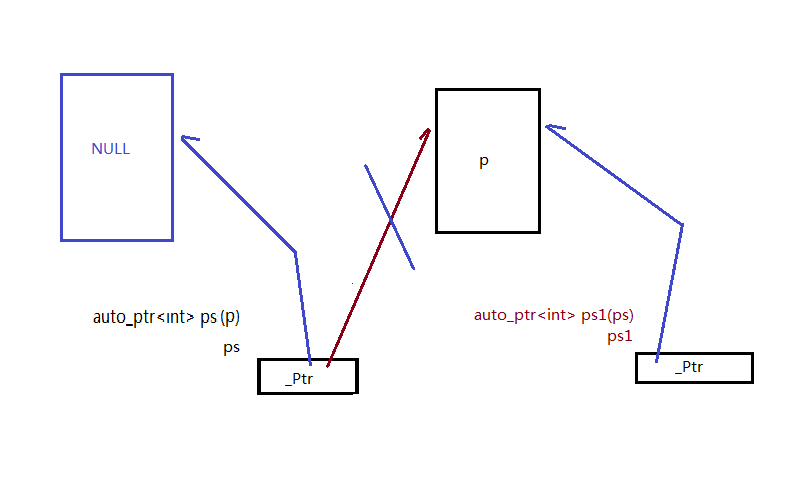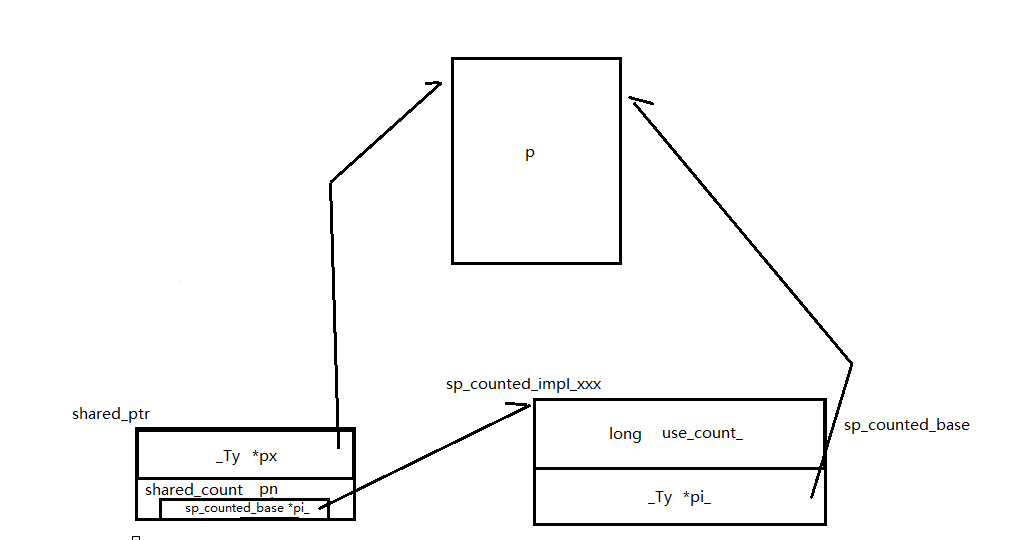无论C还是C++中,我们从一开始接触他们,老时就开始强调在使用后要对内存进行释放,以免发生内存泄露,但是,我们总有粗心的时候,C++中提出了只能指针的概念,用只能指针类来管理所申请的内存,伴随着函数的结束,智能指针自动调用析构函数对其进行释放。
智能指针(auto_ptr)
*auto_ptr指针的所有权可以转移,可以在函数只见传递,但同一时刻只能有一个auto_*ptr管理指针,当auto_ptr对象获得该空间的所有权后,用它来拷贝构造新的对象时,它所管理的指针的所有权也会发生改变,然后将它内部的指针赋空:

简单代码实现:
template<class _Ty>
class auto_ptr
{
public:
auto_ptr(_Ty *_P=0):_Ptr(_P)
{}
auto_ptr(const auto_ptr<_Ty> &_Y):_Ptr(_Y.release())
{}
auto_ptr& operator=(auto_ptr& _a)
{
if(this != &_a)
{
reset(_a.release());
}
return *this;
}
~auto_ptr()
{delete _Ptr;}
public:
void reset(_Ty* _p = 0)
{
if (_p != _Ptr)
{
delete _Ptr;
_Ptr = _p;
}
}
_Ty& operator*()const
{
return (*get());
}
_Ty* operator->()const
{
return (get());
}
_Ty* get()const
{return _Ptr;}
_Ty* release()const
{
_Ty* tmp = _Ptr;
((auto_ptr<_Ty>*)this)->_Ptr = 0;
return tmp;
}
private:
_Ty *_Ptr;
};
int main()
{
int *p = new int(10);
auto_ptr<int> pa1(p);
auto_ptr<int> pa2 = (pa1);
auto_ptr<int> pa3;
pa3 = pa2;
//cout<<*pa2<<endl;
//cout<<*pa1<<endl;
return 0;
}
Scoped_ptr
scoped_ptr与auto_ptr十分相似,它时包装了new操作赋在对上分配的动态对象,能够保证动态创建的对象在任意时候都能被释放,相对于auto_ptr而言,scoped_ptr相对比较“自私”,它的所有权更见严格,一旦将所有权交给它,就无法再将所有权收回来,所以在scoped_ptr不允许进行赋值操作和拷贝构造。你可能会纠结它是如何实现的,就算你不给他赋值和拷贝构造函数,系统也会默认给出。其实很简单,将这两个函数声明为私有的就OK啦,下面我们一起来看下代码吧:
#include <iostream>
using namespace std;
template<typename _Ty>
class scoped_ptr
{
scoped_ptr(const scoped_ptr &_s)
{}
scoped_ptr& operator=(scoped_ptr &_s)
{}
public:
explicit scoped_ptr(_Ty *_p = 0):_Ptr(_p)
{}
~scoped_ptr()
{}
public:
void reset(_Ty *_p = 0)
{
if(_p != _Ptr){
delete _Ptr;
_Ptr = _p;
}
}
_Ty& operator*()const
{
return *get();
}
_Ty* operator->()const
{
return (get());
}
_Ty* get()const
{
return _Ptr;
}
void swap(scoped_ptr &_s)
{
_Ty *tmp = _s._Ptr;
_s._Ptr = _Ptr;
_Ptr = tmp;
}
private:
_Ty *_Ptr;
};
int mian()
{
int *p = new int(10);
scoped_ptr<int> ps(p);
cout << *ps << endl;
return 0;
}在类中成员默认为私有成员,所以这样就无法调动赋值操作和拷贝构造函数了。
scoped_array:
scoped_array主要是用来管理指针的,它的借口功能与scoped_ptr疾苦相同,scoped_array主要特点如下:
1、scoped_array在构造是接受的必须是new[]的结果;
2、scoped_array中没有“*” “->”操作赋的重载;
3、在析构时,用delete[]来释放内存;
4、重载[]运算符,使其能和普通数组一样用下标访问元素;
5、没有begin()、end()等类似容器的迭代器操作函数。
shared_ptr
shared_ptr与scoped_ptr相似,也是包装了new操作赋在堆上分配的动态对象,但它可以实现多个shared_ptr管理同一个指针,因为,它在实现时,在内便加入了使用计数器,只要拷贝一次引用计数器值加1,当引用计数器值不为一时部进行析构,这样防止了一块内存多次析构而导致的程序崩溃:
shared_ptr.h:
#ifndef _SHARED_PTR_H
#define _SHARED_PTR_H
//#include <iostream>
#include "shared_count.h"
#include "sp_counted_base.h"
//using namespace std;
template<typename _Ty>
class shared_ptr
{
public:
shared_ptr():px(0)
{
cout << "Creat shared_ptr!!" << endl;
}
shared_ptr(const shared_ptr<_Ty> &r):px(r.px),pn(r.pn)
{
cout << "Creat shared_ptr!!" << endl;
}
shared_ptr(_Ty *p):px(p),pn(p)
{
cout << "Creat shared_ptr!!" << endl;
}
#if 1
~shared_ptr()
{
cout << " Free shared_ptr!!" << endl;
if(use_count() == 0){
cout << "Really free shared_ptr!!" << endl;
cout << "haha use_count_ = "<<use_count()<<endl;
px = 0;
}
}
#endif
public:
_Ty& operator*()const
{
return *px;
}
_Ty* operator->()const
{
return px;
}
public:
long use_count()const
{
return pn.use_count();
}
public:
void swap(shared_ptr<_Ty> &b)
{
_Ty *temp;
temp = px;
px = b.px;
b.px = temp;
}
private:
shared_count<_Ty> pn;
_Ty *px;
};
#endifshared_count.h:
#ifndef _SHARED_COUNT_H
#define _SHARED_COUNT_H
#include <iostream>
#include "sp_counted_impl_xxx.h"
#include "sp_counted_base.h"
using namespace std;
template<typename _Ty>
class shared_count
{
public:
shared_count():pi_(0)
{
cout << "Creat shared_counted!!" << endl;
}
shared_count(_Ty *p):pi_(new sp_counted_impl_xxx<_Ty>(p))
{
cout << "Creat shared_counted!!" << endl;
}
shared_count(const shared_count &r):pi_(r.pi_)
{
pi_->add_ref_copy();
}
shared_count& operator=(const shared_count &r)
{
pi_ = r.pi_;
pi_->add_ref_copy();
}
~shared_count()
{
cout << "Free shared_counted!!" << endl;
pi_->~sp_counted_base();
if(use_count() == 0){
pi = 0;
}
}
public:
long use_count()const
{
return pi_->use_count();
}
void decrement()
{
pi_->release();
if(use_count == 0){
delete this;
}
}
private:
sp_counted_base *pi_;
};
#endifsp_counted_base.h:
因为shared_count 里边的sp_counted_base *类型的pi_指向的是sp_counted_impl_xxx类里面的基类sp_counted_base,而基类无法调用子类的析构函数,而子类不析构基类也无法析构,所以,为了让他们能准确析构,在这里将sp_counted_base的析构函数定义为虚函数,在sp_counted_impl_xxx内重写。
#ifndef _SP_COUNTED_BASE_H
#define _SP_COUNTED_BASE_H
#include <iostream>
#include "sp_counted_impl_xxx.h"
using namespace std;
//template<typename _Ty>
class sp_counted_base
{
public:
sp_counted_base():use_count_(1)
{
//use_count_ = 1;
cout << "Creat sp_counted_base!!" << endl;
}
virtual ~sp_counted_base() //因为父类无法调用子类内部的函数,所以将其定义为虚函数,以保证它和它的子函数能够正常析构。
{
cout << "Free sp_counted_base" << endl;
}
public:
void add_ref_copy()
{
++ use_count_;
}
long use_count()const
{
return use_count_;
}
void release()
{
-- use_count_;
}
private:
long use_count_;
};
#endifsp_counted_impl_xxx.h:
#ifndef _SP_COUNTED_IMPL_XXX_H
#define _SP_COUNTED_IMPL_XXX_H
#include <iostream>
#include "sp_counted_base.h"
using namespace std;
template<typename _Ty>
class sp_counted_impl_xxx : public sp_counted_base
{
public:
sp_counted_impl_xxx(_Ty *p):px_(p)
{
cout << "Creat sp_count_impl_xxx!!" << endl;
}
~sp_counted_impl_xxx()
{
while(use_count()){
this->release();
cout << "\n\nuse_count() = " << use_count() << endl;
if(use_count() == 0){
delete px_;
cout << "Free sp_count_impl_xxx!!" << endl;
}
}
}
private:
_Ty *px_;
};
#endif
main.cpp:
#include <iostream>
#include "shared_ptr.h"
#include "shared_count.h"
#include "sp_counted_base.h"
#include "sp_counted_impl_xxx.h"
using namespace std;
int main()
{
int *p = new int(10);
shared_ptr<int>pa(p);
cout << "pa = " << *pa << endl;
cout << "pa use_count = " << pa.use_count() << endl;
shared_ptr<int> ps1 = pa;
cout << "ps use_count = " << pa.use_count() << endl;
shared_ptr<int> ps2;
ps2 = ps1;
cout << "ps use_count = " << pa.use_count() << endl;
return 0;
}






















 316
316

 被折叠的 条评论
为什么被折叠?
被折叠的 条评论
为什么被折叠?








